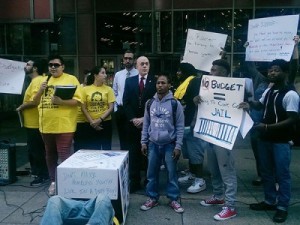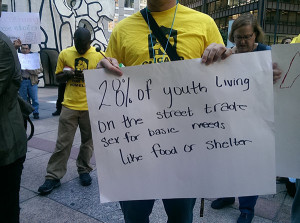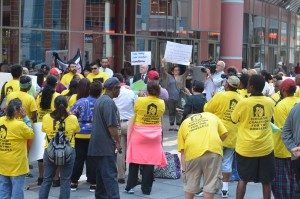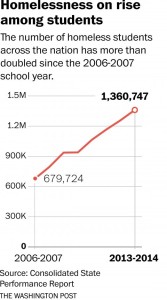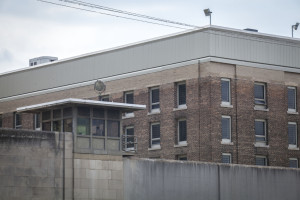By Mark Brown, Chicago Sun-Times columnist
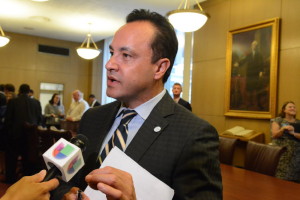
Ald. George Cardenas (12th) says he was only trying to help the homeless when he introduced an ordinance to exempt SROs —single-room occupancy buildings — from the city’s residential landlord-tenant ordinance.
How strange then that all the city’s low-income housing advocates are arrayed against him, while his main support is from an SRO operated by a mob-connected businessman.
The SRO in question — a non-descript facility at 723 W. Grand sometimes known as the Acacia Hotel — is seeking relief from a legal dispute with current and former tenants.
In a pair of class-action lawsuits, those tenants say they were subjected to illegal lockouts, bug infestations and improper late fees.
Cardenas says he proposed his ordinance because such litigation is threatening the city’s dwindling supply of SRO housing by making it too costly to maintain the cheap rents that allow these facilities to serve as a crucial source of shelter for the poor.
But the groups that have led the fight to preserve SROs say there is no evidence of a wider problem and that the alderman’s proposal would take away important legal rights they often rely on to protect SRO residents.
Adding to the intrigue is the involvement of former Ald. Dick Mell, who says Cardenas was so intent on passing his ordinance that he recruited Mell to lobby for it. Mell, who now works as a registered lobbyist, said Cardenas went so far as to help arrange for him to be hired by a lawyer for the building’s owner, SRO Operating Company LLC.
Also showing a keen interest in the affairs of SRO Operating Company LLC is Robert “Bobby” Dominic, whose name can be found on the Chicago Crime Commission charts of the Outfit’s hierarchy.
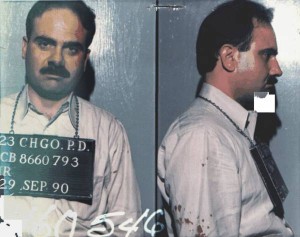
Dominic, 61, has long been identified by law enforcement as a “mob associate” for his involvement in enterprises involving organized crime such as dirty bookstores and peep shows. Though arrested 15 times in his younger days, Dominic has only two minor misdemeanor convictions on his record.
The Chicago Tribune ran an interesting story about Dominic in 2000, explaining how police officers who raided Dominic’s businesses encountered other Chicago cops on the premises providing security for him, the point being that Dominic has a lot of influential friends.
Despite that notoriety, both Cardenas and Mell told me they don’t know Dominic and were not aware of his involvement with the SRO.
The nature and extent of Dominic’s interest in the venture has been a point of contention in Cook County Circuit Court, where he is among several defendants in the aforementioned class-action suits brought by tenant rights lawyer Berton Ring.
The building that houses the Acacia Hotel fronts on both Grand and Milwaukee and is probably most recognizable to Chicagoans as the site of the popular La Scarola Restaurant, a favorite of mine.
La Scarola occupies part of the first floor alongside the notably more downscale Richard’s Bar.
Occupying the second and third floors is the Acacia, previously called the Arcadia, a 45-unit SRO where residents rent rooms for $100 a week and share a bathroom.
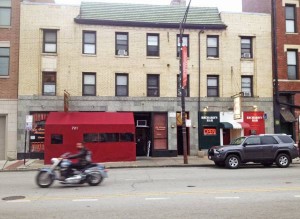
In their lawsuit, former tenants Peter Gabiola and Jerry Weikle say Dominic identified himself as the SRO’s owner and manager, while personally renting out rooms and handling maintenance requests.
In a court affidavit filed in response, Dominic said Richard’s Bar is owned by his sister, Susan Dominic, while SRO Operating Company, her landlord, is managed by Thomas Harris, his close friend since childhood. Because of those relationships, Dominic said he has “from time to time” assisted in both operations but doesn’t own either.
That could explain why it was Dominic who personally convinced one of the SRO’s tenants to sign a release dropping his legal claim, persuading him to accept a month’s rent as settlement.
It also might explain why a police officer listed Dominic as the owner of the facility in a report he filed after Dominic waved him down on the street to make a complaint against one of the tenants who brought the original class-action, alleging months after the fact that the individual had punched holes in the walls.
And it also helps explains why a lawyer for SRO Operating Company asked a federal judge to clarify that the Dominics are covered against the lawsuit under an insurance policy taken out by the company — the company in which they say they have no involvement.
If you can handle one more complication, there’s this:
Records show Florence Posner, wife of Chicago hoodlum Michael Posner, once managed the same property, which also carries the address of 491 N. Milwaukee, prior to its current owners taking over.
Michael Posner, once the mob’s reputed boss in Lake County before he caught a 10-year prison sentence in 1987 for operating a prostitution ring from his nude dancing club, went on to become a casino operator on the Caribbean island of Aruba.
Just another small twist: The city business license for the SRO is held in the name of a Cicero man who died in 2004, although his signature has continued to appear on license renewal applications.
Are you getting the picture?
I dropped by the bar in search of Dominic and left my card but haven’t heard back.
The big question is how this SRO’s problems became the concern of Cardenas, whose Southwest Side ward is far from Grand and Milwaukee.
Cardenas said it began with his idea to fight homelessness by creating additional SRO housing in the city for low-income individuals.
He said he assigned his staff to work on the issue, and they reported back that the big problem driving SROs out of business and discouraging new ones from opening was nuisance litigation brought by class-action lawyers abusing the landlord tenant ordinance.
For evidence of this problem, he could only direct me to Edward Eberspacher, the lawyer for SRO Operating Company. He was fuzzy about how they became acquainted or how Mell got involved.
Mell was more definitive.
“Cardenas called me and asked me would I help him get it passed,” Mell told me. “Cardenas told me to call the attorney or gave the attorney my number.”
Cardenas’ explanation overlooks the fact that what has driven SROs out of business is the soaring demand for rental properties in certain parts of the city that make it far more lucrative for owners to sell out to developers who want to take the buildings upscale and jack up rents.
It also misses the point that the landlord-tenant ordinance has been an important tool of public interest lawyers fighting to protect the rights of residents being driven out of those buildings by landlords who sometimes employ illegal tactics.
Cardenas’ proposal would add SROs to a list of facilities exempt from the landlord-tenant ordinance — joining hotels, motels and roominghouses. Lawyer Eberspacher argues this was always the intent of the original ordinance and that this is only a “clarification.”
While they might pay by the week or month, many SRO residents remain there for years, making them more like apartment dwellers than hotel guests.
Cardenas also proposes to make the change retroactive to the original effective date of the 1986 landlord-tenant ordinance, the combined effect of which would give the SRO more ammunition for its court defense.
I keep thinking somebody conducted the research for Cardenas’ ordinance from a table at La Scarola.
Read our blog about CCH’s work to stop the Cardenas SRO ordinance.

